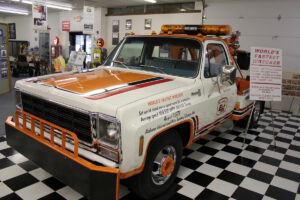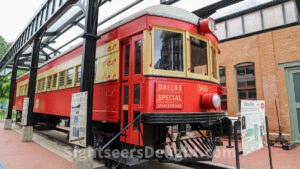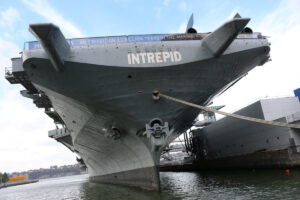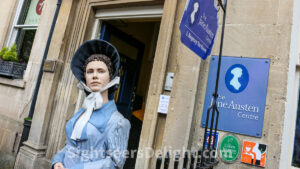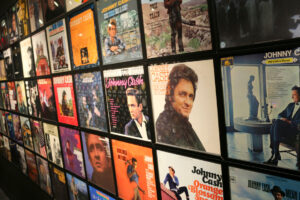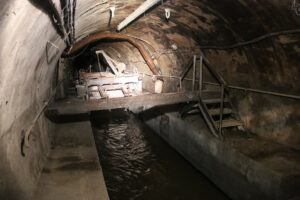Since its first running in 1911, the Indianapolis 500 — known as “The Greatest Spectacle in Racing” — has developed into an institution and a national treasure. The Indianapolis Motor Speedway Hall of Fame Museum, located in the middle of the famous speedway, is dedicated to preserving artifacts related to the races and telling the race’s history. The museum opened in 1956 in a building located outside of the track. Large enough only for a few displays, twenty years later, the museum moved into a new building constructed in the middle of the track’s infield. The museum’s exhibits are constantly changing, and there are usually at least 75 cars on display at any given time.
46222
Located within White River State Park, the museum includes an array of exhibits focused on the science, culture and history of the state. That includes exhibits focused on prehistoric times through the present day. State Librarian R. Deloss Brown is credited with creating the original collection for the museum when he started to amass a collection of minerals and curiosities during the Civil War. The Indiana General Assembly in 1869 passed a law to provide “for the collection and preservation of a Geological and Mineralogical Cabinet of the Natural History of this State.”
46204
Thanks to mechanic Ernest Holmes, Chattanooga is inextricably linked to the world of towing. Holmes invented the tow truck in 1916 in Chattanooga, Tenn. Today, those trucks are indispensable emergency vehicles throughout the world. So, it makes sense the International Towing & Recovery Museum would open here in September 1995. Over its more than 20-year history, the museum has amassed a collection that includes antique and modern tow trucks, photos and related toys. Outside the museum stands the Wall of the Fallen memorial, which includes the names of towers killed in the line of duty.
37408
The Interurban Railway Museum in Plano, Texas, was completed in 1908 by the Texas Electric Railway as its Plano station. The railway used the building until 1948, when it ceased operations, and it stood vacant until 1990, when the city of Plano renovated the building for use as the Interurban Railway Museum. The museum is home to Texas Electric Railway No. 360, a restored car. The Plano Conservancy for Historic Preservation has operated the museum since 2001.
75074
The Intrepid Sea, Air & Space Museum features an incredible collection of military and civilian aircraft. The museum housed on a historic aircraft carrier at Pier 86 at 46th Street in the Hell’s Kitchen neighborhood on the West Side of Manhattan.
10036
Author Jane Austen lived in Bath from 1801 until 1806, and the Jane Austen Centre on Gay Street explores the effect Bath had on Austen’s writings. The museum is certainly a must-see for Austen fans, but it’s also for visitors looking to learn more about historic Bath through the experiences of one of its favorite residents.
The Johnny Cash Tennessee, Museum opened its doors to the public in May 2013. The museum, located in downtown Nashville, features a remarkable collection of Cash artifacts, including the standard concert posters and album covers. But the museum’s collection includes more off the beaten path artifacts such as the first wills of Cash and his first wife, Vivian; an artist royalty check from 1957; tin cups from Folsom Prison given to Cash in 1968, and handwritten lyrics of “Walk the Line” that cash wrote in 1990 for museum founder Bill Miller.
37201
Since 2006, the Pinball Hall of Fame has featured a vast array of pinball machines – ranging from modern machines to rarer classics. The attraction is free to visit, but it costs to play pinball. Still, it’s cheaper than the craps table.
89119
The LBJ Presidential Library gives visitors have the opportunity to learn about America’s 36th President, Lyndon B. Johnson, a particularly complex leader. The museum features state-of-the-art exhibitions to highlight many of the critical issues Johnson faced, including education, civil rights, the environment and the Vietnam War. Visitors can pick up a telephone and listen to audio recordings of Johnson as he conducts business. Beyond the political aspects, the museum sheds light on the personal lives of the president and the first lady, Lady Bird Johnson. The library was dedicated in May 1971 and is one of fourteen presidential libraries administered by the National Archives and Records Administration.
78705
For anyone interested in learning more about the complex maze of sewers winding its way beneath the Parisian streets, a visit to Le Musée des Égouts de Paris (the Paris Sewer Museum) is a must. The museum is located beneath the Quai d’Orsay near the famous Pont de l’Alma in the city’s 7th arrondissement and chronicles the need for sewers and their construction. Exhibits include replica and equipment used in the upkeep of the system, such as a giant ball used to clear clogs. An actual sewer line, complete with raw sewage, running below reminds museum-goers’ that while the museum and the city’s underground may be out of sight, it’s not always out of smell. A visit to the museum can take an hour or so, less for anyone who might be unable to keep their olfactory senses in check.


